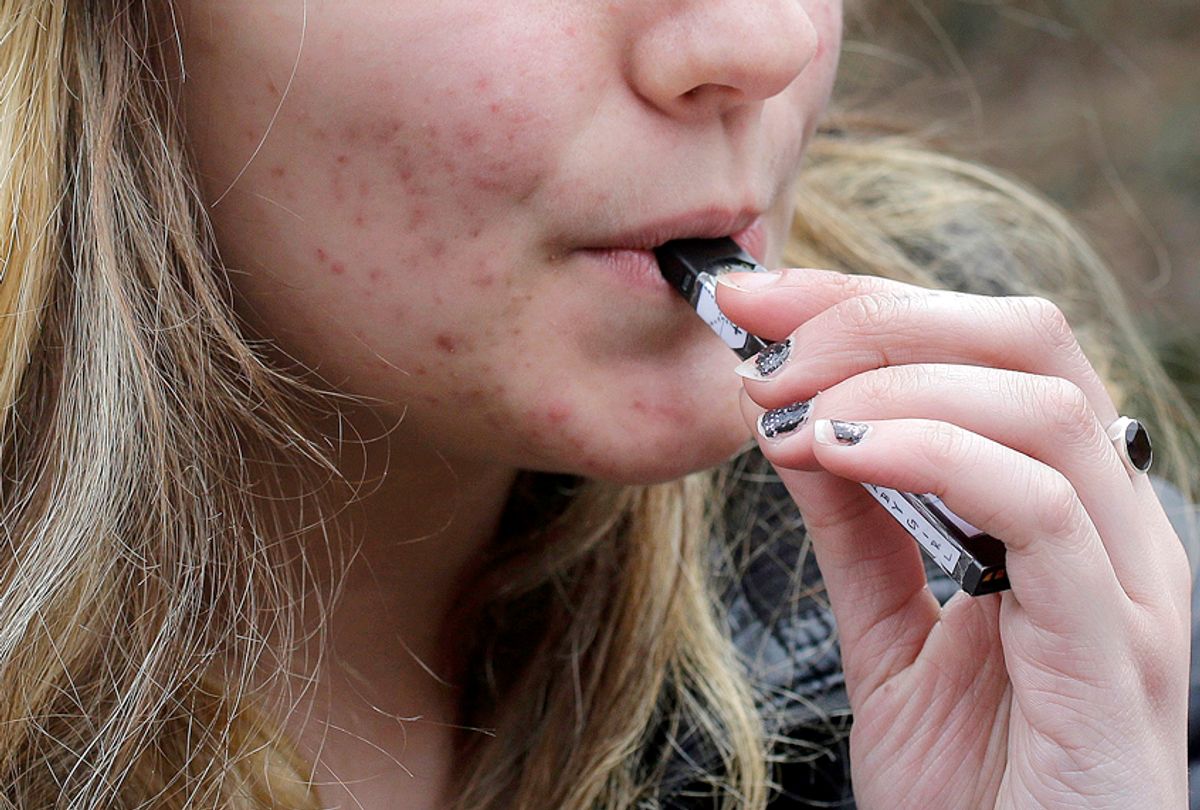For a decade, pediatricians and public health groups have been warning the U.S. Food and Drug Administration of an epidemic of electronic cigarette use among American teens. On Wednesday, the agency finally announced its plan to take action, in what the federal agency says is its “largest single enforcement action in agency history.” But some public health advocacy groups warn that the FDA's latest move doesn't go far enough.
“Their daily business is to send warning letters to businesses that have sold tobacco products to kids,” Erika Sward, National Assistant Vice President of Advocacy at the American Lung Association (ALA), told Salon. “What the Lung Association is calling on them to do is to take meaningful action and take the control they have, according to the Tobacco Control Act, which would be to remove products.”
In the official announcement released this week, the FDA proclaimed that teenage use of e-cigs, such as the Juul (pronounced like "jewel"), have reached an “an epidemic proportion.” As a result, more than 1,300 device makers, such as Juul Labs, and sellers, including 7-Eleven stores and Walgreens, have been put on notice and given 60 days to prove they can keep their products away from minors. If they fail to prove they can keep the devices out of teenagers’ hands, the agency may remove their products from the market.
Civil money penalty complaints (fines) have also been sent to retailers who illegally sold Juul devices and other e-cigarettes which were found during “a nationwide, undercover blitz of brick-and-mortar and online stores this summer,” according to the announcement.
“We cannot allow a whole new generation to become addicted to nicotine. In the coming weeks, we’ll take additional action under our Youth Tobacco Prevention Plan to immediately address the youth access to, and the appeal of, these products,” FDA Commissioners Scott Gottlieb said in the statement. “Today, we asked five e-cigarette manufacturers to put forward plans to immediately and substantially reverse these trends, or face a potential decision by the FDA to reconsider extending the compliance dates for submission of premarket applications.”
Yet Sward said asking the tobacco industry to self-regulate is counterintuitive — especially since the Tobacco Control Act of 2009 gives the FDA the authority to regulate the tobacco industry.
“The industry cannot voluntarily take action,” Sward added. “They know if they don’t addict them when they are young they won’t have them as customers for as long as their lives might be.”
While federal agencies under the Trump administration have generally hewn to a deregulatory, pro-big business agenda, the FDA's libertarian approach to e-cigarette regulation is not necessarily a result of President Donald Trump’s leadership.
“The FDA under both Obama and the Trump administration has kicked the can down the road instead of taking meaningful action, and the result is we are at risk of losing another generation of kids to tobacco products,” Sward said. “The FDA has the tools, but they lack the political will.”
The American Academy of Pediatrics (AAP) echoed the American Lung Association's sentiments. In a statement, the organization’s president Colleen Kraft, MD, MBA, FAAP, said while they appreciate the FDA's words, the FDA must support this announcement with regulatory action.
"The AAP rejects FDA's decision to allow five leading e-cigarette manufacturers to submit plans in 60 days for how they will address youth use of their products. FDA has the ability today to do what tobacco companies can't and won't do: take effective steps to reduce and eliminate youth use of e-cigarettes,” Kraft said in the statement. "The Academy urges the agency to use its existing authority to immediately regulate all e-cigarettes. In fact, the AAP has joined other leading health and medical groups in legal action to compel FDA to do just that.”
Likewise, Chris Hansen, president of the American Cancer Society Cancer Action Network, agreed in a statement.
“When Congress passed the Family Smoking Prevention and Tobacco Control Act in 2009 it gave FDA the tools and authority needed to adequately regulate tobacco products and prevent youth from starting tobacco use,” Hansen said. “However, because of numerous rule-making delays and a seeming reluctance to fully assert its authority, FDA for years has repeatedly missed opportunities to keep tobacco products out of the hands of our children and we have seen e-cigarette use among youth hit epidemic levels.”
“We urge FDA to require pre-market review of all new tobacco products and prohibit the sale of all flavored tobacco products, including e-cigarettes, unless those products undergo full pre-market review,” he added.
The aforementioned organizations are three of 12 public health groups and individuals who filed a complaint against the FDA in March 2018, alleging the FDA’s resistance to take regulatory action was unlawful.
“Plaintiffs, public health organizations and pediatricians with vital and concrete stakes in seeing the Tobacco Control Act’s mandates fully implemented, bring this action under the APA, seeking vacatur of FDA’s Guidance and other declaratory and injunctive relief,” the official complaint stated.
Meanwhile, e-cigarette use among teens continues to rise. According to the Washington Post, unreleased data shows there has been a 75 percent increase in e-cigarette use among high school students in 2018 compared to 2017. The FDA reportedly declined to release the data, according to The Post.



Shares